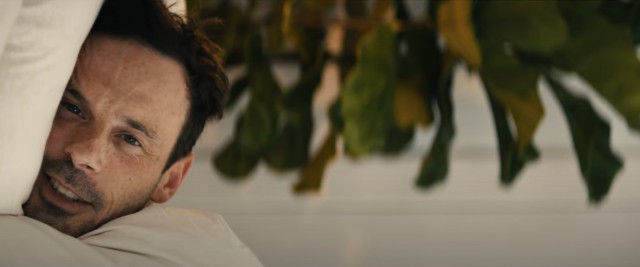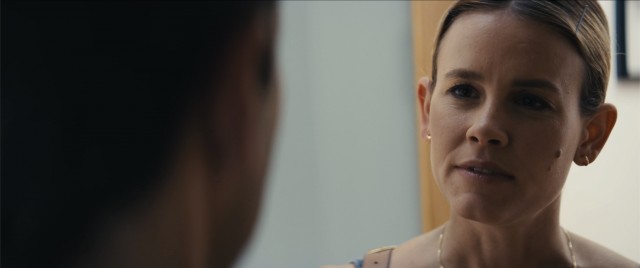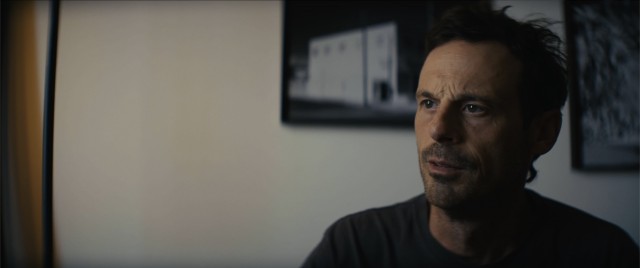Anyone who has ever tried online dating will recognize the conundrum: you connect with someone on a dating app and as the conversation flows you start to build an image of that person in your head. Depending on how long it takes, from the first few messages to that in-person meet-up, you might even think you know exactly who you’re going to encounter in the flesh. But when the day comes and you finally meet them in real life, they don’t quite match the image you’ve built up. How do you deal with the situation? You try to rekindle the energy from your previous online conversations, but something just feels off. What do you do?
Mohamad El Masri, a writer and co-executive producer on Apple TV+’s Severance, takes this familiar dilemma of modern dating and amplifies it to new heights in short film Other Other. By pushing the narrative design to the extreme, he transforms this common experience into something entirely unique, adding an existential twist to the challenges of starting a relationship in the modern age.

Scoot McNairy in Mohamad El Masri’s Other Other
In the film’s opening scene, a woman and a man (played by Sosie Bacon and Scoot McNairy, respectively) are shown lying in bed together, engaging in conversation. Their discussion shifts between playful jibes and more serious notes, the way things might go between a couple on a sleepy morning. At first glance, they appear to be together in both senses of the word. However, after only a few minutes, it becomes clear that there was something particularly perfidious about the way their conversation was framed.
Although these two have known each other for over a year, this evening will be their first time together in the same physical space. But what if that’s easier said than done? The simple phrase “find you later“ will have much more profound implications when the two have a hard time actually linking up with each other for their scheduled dinner date. It seems as if they’re existing on two different levels, when the metaphysical confusion quickly becomes a real struggle for them to connect beyond their phones.
“What is intimacy in the post-digital world?”
Writer/director El Masri describes Other Other as “a grounded, personal, intimate fairy tale and love story between two people in an impossible romance” and “a metaphor for the difficulties of modern-day relationships”. As the filmmaker adds, his short tackles questions like “what is intimacy in the post-digital world? Is the internet more real than reality?“ Taking it one step further, Other Other posits the following question: what if the person you meet in real life after getting to know them online is, quite literally, a different version of themselves?
Just as films about online dating have become a familiar narrative trope, the concept of the multiverse is also becoming a well-trodden storytelling path itself. However, as films like The Daniels’ Everything Everywhere All At Once prove, there’s still a lot of room to explore parallel realities in a creative way. The same applies to the topic of online dating, a modern iteration of the timeless pursuit of romantic love – a theme that will always offer potential for compelling stories. The challenge lies in whether storytellers can find fresh and interesting ways to say something about the matters of the heart.

Sosie Bacon in Mohamad El Masri’s Other Other.
In the case of Other Other, the concept of alternate universes and parallel versions of ourselves works as an interesting device to explore the ideas within the film. While the basic premise invokes science-fiction elements, the film grounds itself through an inherently realistic set-up and the deeply human problems at the heart of the story. “Above all, we made a clear choice very early on to keep the story in the ‘fantasy’ or surreal and magical realism space“, El Masri reveals. “It’s not science fiction. In this way, we never got bogged down in ‘explaining the rules’ — the rules don’t really matter.”
Due to its clever storytelling techniques, heady-experimental take on the subject matter, melancholic romantic tone, and its thought-provoking exploration of the need for love, Other Other reminded me of films like Sam Esmail’s Comet and Michel Gondry’s Eternal Sunshine of the Spotless Mind. Which, personally, is one of the highest compliments I could give to a film that deals with the grasp we hold on a romance that is seemingly slipping through our fingers.
The genesis of the short film can be attributed to El Masri’s own thoughts about some of the underlying questions that the film grapples with. As he explained to S/W, the director was also “looking to examine [his] own personal experiences with committed, long-distance, online relationships”. Blending these with the “tensions and pressures of committing to a relationship in the real world”, to create the narrative of Other Other.
With the film beginning as a pilot script, penned several years ago, it was only during the writers strike of 2023, when he was looking for a project to flex his creative muscles, that El Masri decided to pitch a short-film adaptation of the script to cinematographer Joshua Knoller.

“The apartment, the door, the building, becomes a character” – El Masri discussion the decision to shoot in one location.
“The biggest, and most important decision we made, was to limit the film to one location”, El Masri reveals as we discuss his production. Looking to “maximize what we could do with an intimate love story”, the visuals work to “elevate the premise and emotional/physical hurdles” the characters are facing”.
Elaborating on the conjunction between the technical side of the cinematography and its influence on the character-dynamics, the director explained how the use of “anamorphic lenses used with an open gate […] helped us build a visual motif in an interior space. Adding that he believed that this “created separation and distance between the characters. […] Even though the spaces are intimate, the distance is expanded by this lens choice.”
None of this would have been as effective if it wasn’t for two key factors: first, the winning script, which combines humor with a detailed understanding of the intricacies of a burgeoning relationship through witty and emotional dialogue. The other convincing factor is the excellent cast made up of Sosie Bacon and Scoot McNairy, who El Masri describes as “essential to the creative process” – as they helped to “evolve” the script and “elevate” the production.

“All that matters is the emotional consequences of this situation our characters find themselves in” – El Masri discussing the aims of his film
While Bacon gives a heartbreaking performance as the female lead, I have to admit that I’m always partial to anything McNairy stars in. His roles, ranging from music videos and bit parts in big budget films, to Oscar fare and leading roles in fan-favorite TV series, in all his performances there’s a certain mischievousness and arrested vulnerability. This also applies to the two versions of the male protagonist in Other Other, as every doubt and insecurity can be seen, and felt, across the actor’s face, adding to the bittersweet longing the character feels way before he has to articulate it.
Beyond its metaphorical take on online dating, Other Other can also be seen as an exploration of the changing nature of any relationship. It raises questions about how to handle the reality that your partner might not be the person you initially fell in love with. While also considering the possibility that you could actually be the one who has changed to the point that your current partner is not a fit anymore.
Over time, we all become replicas of ourselves, alternate versions that look and sound like us, but who are essentially very different from who we once were. The self itself is fleeting, making it all the more difficult for our significant other to make sense of the person in front of them, and vice versa. If you struggle to recognize them, you might need to ask the question: what if they have become an other other?

 Georg Csarmann
Georg Csarmann